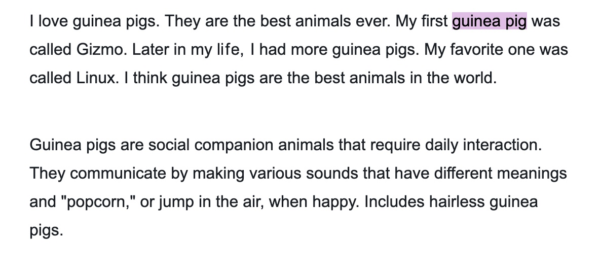Exact keyword matching used to be an important SEO tactic, but those days are long gone. Now search engines can understand when similar phrases and related terms mean the same thing. Adding too many exact match keywords might make Google think your post is just another piece of spam. We’ll explain how to write naturally and still use your keywords.

Quality content matters now more than ever!
Have you heard about Google’s helpful content update? From now on, the quality of your content could have an even bigger impact on your rankings.
We know that creating high-quality content isn’t easy. But our Premium SEO analysis can help! It’s just as smart as Google, helping you create rich and helpful content in a natural way and improving your rankings!
As we mentioned in the introduction, focusing on just exact keyword matching isn’t really necessary anymore. It can actually be harmful to your SEO by making your writing seem spammy. Nowadays it’s much better to write in a natural way, using a variety of related keywords and phrases instead.
What does writing naturally mean?
Using a natural writing style means that if someone reads your text aloud, it sounds like normal human speech. Think of the way it sounds when a friend, family member, or teacher explains something to you — that’s ‘natural’. In contrast, a legal document or a technical handbook is written in an ‘unnatural writing style’; very few (if any) people speak in that way.
A natural writing style has lots of benefits! It’s usually more comfortable for users to read, and can be a lot more engaging. Many people find writing in a natural way easier, too. Think about it — reading a magazine article feels a lot more enjoyable than reading a set of terms and conditions. It feels like the author is talking to you, and you can get to know the person writing.
Natural writing and SEO
It can be easy to end up writing in an unnatural way when you’re working on SEO. Thinking too much about keywords and calls to action can be a distraction. The result? You produce clunky, hard-to-read text with too many keywords, or keyphrases squeezed in where they don’t belong. Ultimately, that’s not a compromise worth making. Those keyphrases aren’t likely to help your rankings much, and any user who does find your page in the search results probably won’t read your content.
In fact, in Google’s helpful content update, they’ve come right out and said it: “helpful content written by people, for people” is what they want to see. Content which is automatically generated or spam-full with keywords is not. Does that make it harder to optimize your text for search engines? Not necessarily.
At Yoast we encourage you to use synonyms, variations of your keyphrase and related keywords to optimize your text. It’s better if you don’t spend all your effort trying to fit multiple repetitions of your exact keyphrase into your content. When we speak naturally, or write naturally, we say the same thing in lots of different ways. Your SEO-optimized text can be like that too.
“Yoast SEO only recognizes my exact focus keyphrase”
Imagine this: you’re trying to optimize your post for the term [guinea pig]. In your text, you’ll probably use guinea pig (singular) and guinea pigs (plural). However, if your focus keyword is the singular [guinea pig], the keyword density check does not recognize your plurals and will give you a red traffic light.


The free version of Yoast SEO is great for getting a general idea of how many times you mention your focus keyword. But if you want to write naturally and get the best SEO results, our premium plugin can help.
Our premium analysis can help
How does the analysis in Yoast SEO Premium help you to write more naturally? Firstly, in the premium analysis, plurals and past tense are recognized as occurances of your focus keyword and they’ll count towards your SEO assessment. In this example, both guinea pig and guinea pigs are highlighted:

Besides allowing variants of your keyword, the premium analysis also lets you add related keywords and synonyms. So for instance, instead of always using the keyphrase guinea pig, you can switch it up and refer to cavia or cavy instead, which is another name for the guinea pig. When you add cavy as a related keyphrase, you’ll get another SEO check for that phrase too.
Let’s look at another example: if your focus keyphrase is [playing with your cats], it will recognize that keyphrase in the sentence ‘You can use toy mice to play with your cat‘. Or, if you want to optimize for [games for cats] it will recognize it the sentence, ‘Another game your cat will love …’ as well. The analysis is able to recognize these variations on your keyphrase and add them up to your total usage of the focus keyphrase.
Yoast SEO Premium makes it easier than ever to write SEO-optimized texts in a natural way. And it gets even better — by using synonyms and related keyphrases, you increase you chances of ranking for different related queries in the search results too! Read more about this in our post about how to use synonyms and related keywords.
Read more: “Yoast SEO hates my writing style!”- 6 common misconceptions about Yoast SEO »
Focus on writing naturally
The whole idea behind our premium analysis is that you are able to write naturally and still optimize for the search engines. Our plugin will give you little nudges to optimize your text a bit more, without tempting you to chase the green traffic lights with exact keyword matching. This means: no more awkwardly rewriting your sentences, so the SEO analysis picks up on your keyword. No more wondering if you really didn’t use your keyword often enough, or if the plugin simply doesn’t recognize every instance. Just focus on writing quality content that users will enjoy reading!
The post How to write naturally beyond exact keyword matching appeared first on Yoast.


